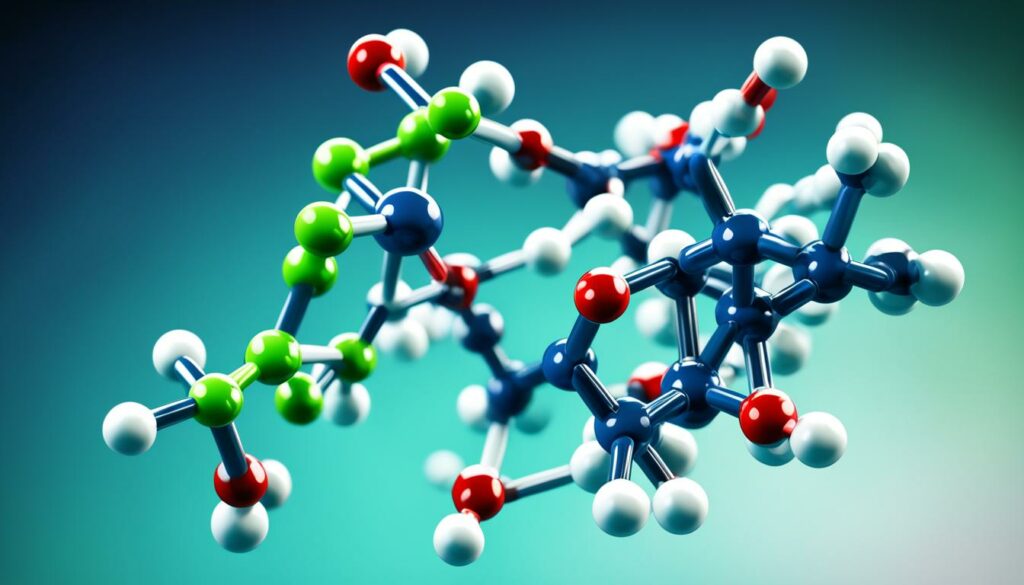In the world of supplements aimed at boosting testosterone, one amino acid often gets a lot of attention. This is D-Aspartic Acid. It’s known for its role in hormone health.
Some say it can raise testosterone levels. But there’s a mix of myths and some truth to these claims. About 3% of men between 30 and 79 years old have low testosterone.
And every year after 30, men’s testosterone naturally drops 1-2%. So, finding ways to keep hormones balanced is very important. We’re here to separate the real facts from the myths about D-Aspartic Acid and testosterone. We’ll look closely at what the science says.
Key Takeaways
- Understanding the role of D-Aspartic Acid in testosterone production
- Separating evidence-based outcomes from widespread myths in testosterone supplements
- Discerning credible scientific studies that investigate the efficacy of D-Aspartic Acid
- Recognizing the reasons behind testosterone decline and possible symptoms in men and women1
- Evaluating natural testosterone boosters in comparison to D-Aspartic Acid
An Overview of D-Aspartic Acid and Its Biological Functions

The amino acid D-Aspartic Acid plays a vital part in many biological processes in different species. It is unique because it helps make and control hormones.
Understanding Amino Acids and Their Roles
Amino acids are the building blocks of proteins and are key for life. They are involved in everything from cell structure to making enzymes and neurotransmitters. D-Aspartic Acid, a special kind of amino acid, has unique effects on hormones2.
The Specificity of D-Form Amino Acids
D-form amino acids, like D-Aspartic Acid, are found in many animal tissues. They play key roles in the nervous and endocrine systems. Their presence shows the complexity of compounds that regulate biological functions2.
Hormonal Implications of Aspartic Acid Isomers
The D-Aspartic Acid form is notable for influencing important hormones. It affects the creation and release of luteinizing hormone (LH) and testosterone. This has implications for animals and humans alike2.
Studies show D-Aspartic Acid is important for hormone-related signals. It helps with steroid creation, especially in green frog testes and affects key steroid genes. It also plays a role in testosterone synthesis in human and rat testes. Its presence in the brain and nervous system shows it has a wider role in hormonal control2.
D-Aspartic Acid not only impacts testosterone but also brain functions. It is involved in learning and memory in mammals. It also affects how the nervous system works in marine life, underlining its widespread importance2.
D-Aspartic Acid has a broad role in biology, not just in hormones. More research could show even more about its effects on our bodies and brains.
| Organism | Tissue | Biological Role of D-Aspartic Acid |
|---|---|---|
| Rana esculenta | Gonad | Control of testosterone production2 |
| Podarcis s. sicula | Ovary | Enhancement of aromatase activity2 |
| Rat | Neuroendocrine Tissues | Modulation of LH and growth hormone release2 |
D-Aspartic Acid and Testosterone: The Scientific Evidence
Studies have explored how D-Aspartic Acid affects testosterone and our body systems2.
It’s found in animals and plays a key role in both the brain and hormone systems. This acid is in the reproductive organs of various animals and even in different rat parts2. Research shows it helps make testosterone and improve sperm quality in rats. This hints it could do the same in humans2.
In detailed studies, D-Aspartic Acid in boar testis works with nitric oxide. This process affects androgen and testosterone during reproduction cycles2. This discovery shows promise for treating low hormone levels in humans and animals2.
D-Aspartic Acid also boosts enzyme activity tied to hormones. Studies link it to higher aromatase activity in lizards and more testosterone in frogs and lizards. This supports its potential hormone-related benefits2.
Recent research focuses on D-Aspartic Acid helping control genes for steroid production, particularly the StAR protein. This suggests it might help increase testosterone levels2.
- It helps regulate a gene for androgen production in rat Leydig cells2
- It boosts important steroid-producing enzyme activities in rat testes2
- It’s linked to pathways that may upregulate androgen receptor expression in rats2
While results look promising, experts urge caution and call for more research. They stress the need for more studies to fully understand how D-Aspartic Acid can boost testosterone in various animals. This ongoing research will help us better grasp its benefits for hormone health and treatment possibilities.
Debunking Common Misconceptions: Benefits of D-Aspartic Acid
Many believe things about D-Aspartic Acid that aren’t true. It’s time to clear up what it really does for strength, muscle growth, fertility, and hormones. With more people using testosterone supplements, understanding D-Aspartic Acid is key.
Addressing the Claims: Strength and Muscle Mass
People often turn to testosterone boosters for better strength and muscle mass. But, D-Aspartic Acid’s real impact is complicated. Some research suggests it might help build muscle and strength. Other studies, though, don’t see much difference. Still, having the right hormone levels is critical for muscle health, especially for older men at risk of low testosterone.
The link between exercise, supplements, and testosterone can’t be ignored. For instance, men who worked out and took magnesium saw a boost in their testosterone. This finding might change how we see the effects of supplements on their own.
D-Aspartic Acid’s Influence on Fertility
Talking about fertility, D-Aspartic Acid’s role becomes quite relevant. Its impact on fertility isn’t fully clear yet. But, testosterone, which D-Aspartic Acid could affect, is crucial for reproductive health. So, this amino acid might help with fertility after all.
Analyzing the Research: Hormonal Balances
Many men try supplements to fix their hormonal balances. As we age, our testosterone goes down 1% to 2% each year, affecting our health. D-Aspartic Acid might not fix everything, but a healthy lifestyle can help keep hormones in check. This includes good sleep, which is closely linked to testosterone production.
Choices like heavy drinking can mess with hormone levels. But, reducing stress can boost them. In fact, lowering stress is shown to up testosterone, whereas high stress does the opposite.

In short, D-Aspartic Acid plays a role in managing testosterone, but we should keep our expectations real. For better testosterone and hormone health, a healthy life with proper diet, exercise, and stress control is key. D-Aspartic Acid can help, but it’s not the only thing that matters.
Optimizing Testosterone: The Role of Natural Testosterone Boosters
Talking about boosting testosterone, people often compare natural and synthetic boosters. Many seek natural methods for their benefits and fewer risks. Options like D-Aspartic Acid (DAA), naturally found in animal tissues, are getting attention. This is due to significant research showing its effects on hormonal health2.
Comparing Synthetic and Natural Boosters
Synthetic boosters can cause negative side effects and dependency. This makes natural boosters look safer. D-Aspartic Acid helps make testosterone and controls its production in certain animals 2. However, its effects on humans need more understanding. People should know natural boosters work gently but are important for balance.
D-Aspartic Acid among Other Natural Options
D-Aspartic Acid is well-known for its role in testosterone synthesis. Research shows it boosts enzymes and hormonal pathways crucial for testosterone production in rats 2. When choosing boosters like DAA, it’s important they match our body’s needs. They should support our testosterone levels safely, unlike synthetic boosters.
FAQ
What is D-Aspartic Acid?
D-Aspartic Acid (DAA) is an amino acid. It helps make protein and hormones in our bodies.
What are the biological functions of amino acids?
Amino acids are the building blocks for proteins and hormones. They play a key role in how our bodies work.
How are D-form amino acids different from other amino acids?
D-form amino acids, like D-Aspartic Acid, help control hormones. They can boost testosterone production in our bodies.
Is there scientific evidence supporting the impact of D-Aspartic Acid on testosterone levels?
Yes, research shows D-Aspartic Acid may increase testosterone. But, not all studies agree on its effects.
What are the benefits of D-Aspartic Acid?
D-Aspartic Acid doesn’t directly increase strength or muscle size. It doesn’t greatly change fertility or hormone levels either.
How does D-Aspartic Acid compare to synthetic testosterone boosters?
D-Aspartic Acid is a natural way to possibly boost testosterone. It’s safer and more sustainable than synthetic options.




